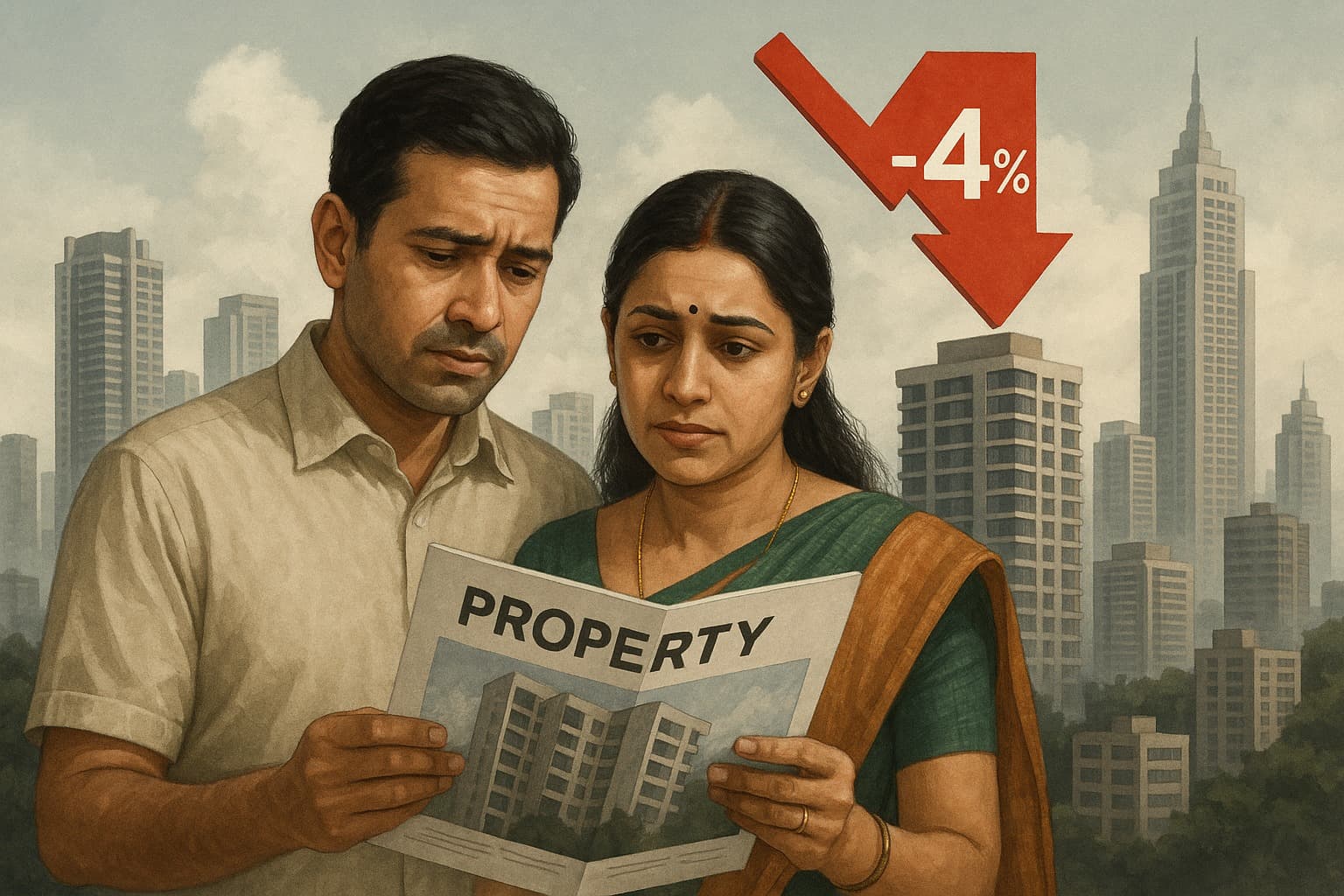Indian Housing Market: Analyzing the 4% Dip in Sales Across Top Cities
Summary
Indian housing sales are expected to dip 4% across top cities in the September quarter of 2025 due to rising prices and interest rates. Experts predict a rebound during the festive season, offering opportunities for buyers and developers.

For millions of Indians, buying a home is not just a financial decision — it’s a dream wrapped in years of saving, sacrifices, and aspirations for a better life. The Indian real estate market, however, is now showing signs of a gentle pause. Recent data suggests that the September quarter of 2025 may see a 4% dip in housing sales across the top nine Indian cities.
On the surface, this slowdown might look like just another statistic, but behind it are stories of families delaying their home purchases, investors reassessing risks, and developers rethinking strategies. Let’s dive deeper into what this really means for India’s housing market and the people who shape it.
Why Housing Sales in India Are Slowing Down
The real estate market in India is never static; it breathes with the economy, people’s incomes, and the pulse of urban life. The property sales dip this September quarter is largely the result of:
Soaring property prices, making homes less affordable.
Higher interest rates on home loans, straining middle-class budgets.
Delays in project deliveries, creating hesitation among buyers.
Seasonal dips in demand before the festive quarter.
While a 4% decline in housing sales in Indian cities doesn’t sound alarming, it reflects a moment of caution — where buyers are holding back, hoping for either better affordability or festive offers.
The Top 9 Indian Cities Feeling the Slowdown
Each city tells a unique story of growth and struggle in the real estate journey. Here are the top nine cities where the slowdown is most visible:
Mumbai Metropolitan Region (MMR) – A city of dreams, but also of soaring property prices. Buyers are waiting for affordability to return.

Delhi-NCR – Still buzzing with demand, yet mid-income buyers are feeling the pinch.
Bengaluru – The tech hub has jobs and opportunities, but oversupply in certain areas has cooled demand.
Pune – Once affordable, Pune’s rising prices are now testing buyer patience.
Hyderabad – A star performer for years, but rapid price growth has slowed momentum.
Chennai – Affordable homes sell, but premium apartments are struggling.
Kolkata – A traditionally cautious market, where affordability always matters most.
Ahmedabad – Growing fast, but buyers are cautious in the face of new launches.
Gurugram (NCR) – Luxury launches flood the market, but sales haven’t kept pace.
Together, these cities drive nearly 70% of housing sales in India. So when they pause, the whole market feels it.
Why a 4% Dip Matters to Buyers and Sellers
A 4% dip in housing sales in India’s property market might not look dramatic, but for ordinary families, it matters. A young couple in Bengaluru saving for their first flat may now reconsider, fearing rising EMIs. An investor in Gurugram might hesitate, unsure of whether luxury demand will sustain. Developers, too, are reworking payment plans and considering discounts to keep momentum alive.
This slowdown is less about fading demand and more about people pausing to breathe, to calculate, and to wait for the right moment.
Real Estate Slowdown Trends in 2025
The real estate slowdown in Indian cities in the September quarter of 2025 is being seen as a temporary cooling phase. Experts predict that the festive quarter ahead will revive sales, as Indians have always linked property buying to auspicious occasions.
Some clear property market trends in India 2025 include:
Affordable and mid-segment housing continues to dominate demand.
Luxury housing is struggling, especially in big metros.

Ready-to-move-in projects are preferred over under-construction homes.
Developers are increasingly using digital tools to attract buyers.
What This Means for Real Estate Investors
For investors, the September quarter property sales decline across Indian cities is both a caution and an opportunity. Slower sales may lead to:
Better negotiation power, as developers offer attractive deals.
Price stability, which could make entry more affordable.
A reminder that real estate is a long-term journey, not a short sprint.
In fact, many seasoned investors see this as the perfect moment to step in before the festive rush drives demand back up.
Looking Ahead: A Pause Before the Next Leap
The impact of housing sales dip on India’s real estate market should not be mistaken for a collapse. India’s growing cities, its youthful population, and the deep-rooted aspiration to own a home mean that demand will always return.
For buyers, this slowdown is a chance to negotiate smarter deals. For investors, it’s a reminder to diversify and think long-term. For developers, it’s a nudge to focus on affordable, transparent, and timely projects.
The September quarter may feel like a slowdown, but it’s really just the market gathering strength for the next wave of growth.
Final Thoughts
Owning a home in India is more than a financial decision; it’s a symbol of stability, belonging, and pride. The 4% dip in housing sales across nine Indian cities in the September quarter reminds us that while markets may fluctuate, the human desire for a home never fades. This is not the end of growth, but rather a pause — a chance for buyers, sellers, and developers to reset their expectations before the festive season lights up the market once again.
Summary (100 words)
The Indian real estate market is expected to see a 4% dip in housing sales in the September quarter of 2025, affecting nine major cities including Mumbai, Delhi-NCR, Bengaluru, Pune, Hyderabad, and Gurugram. Rising property prices, higher home loan rates, and project delays are key reasons for this slowdown. While demand seems softer, experts view it as a short-term correction rather than a long-term decline. For buyers, it’s an opportunity to secure better deals; for developers, a chance to focus on affordability. With the festive season approaching, the market is expected to rebound strongly in the coming months.
